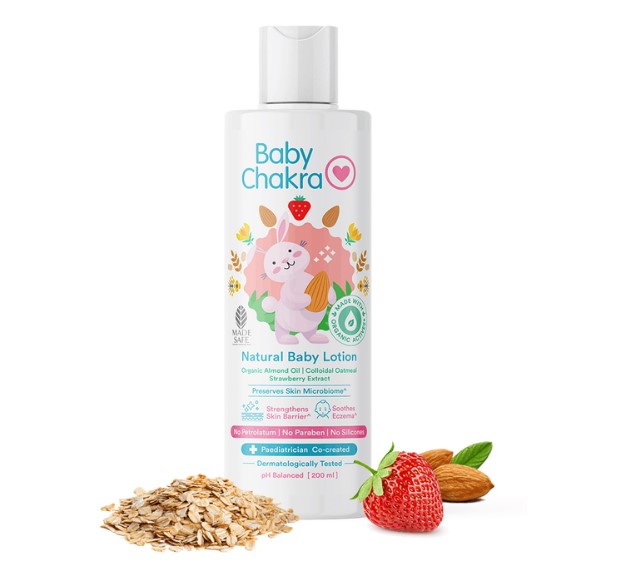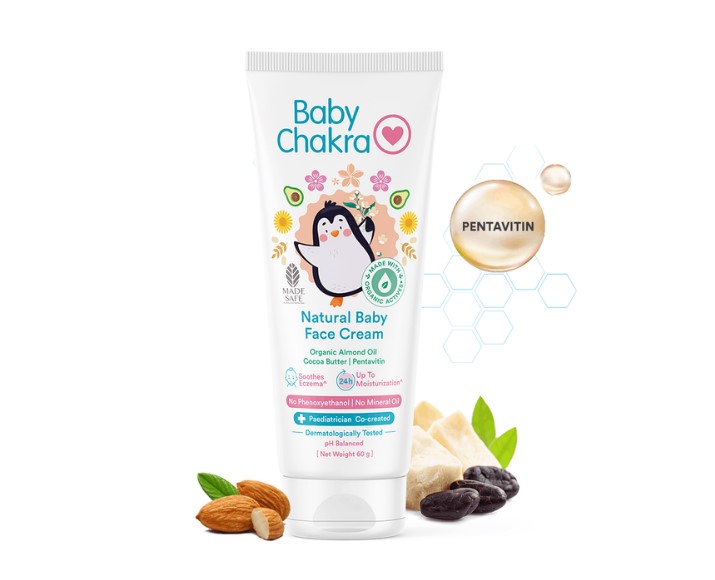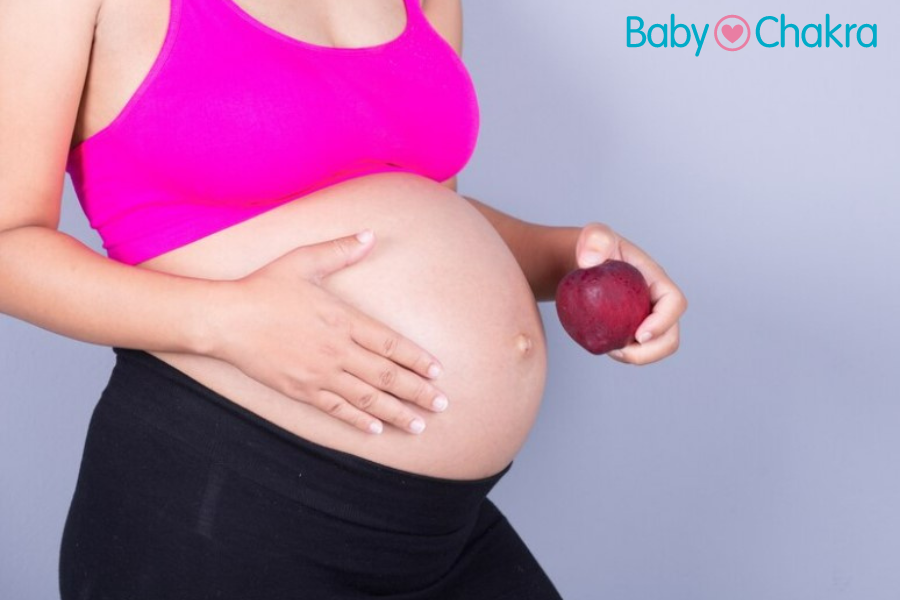
10 Surprising Benefits Of Eating Beetroot During Pregnancy
25 May 2023 | 7 min Read
Sudeshna Chakravarti
Author | 799 Articles
Beetroot offers several essential nutrients and dietary fibre that contribute to your daily nutritional requirements. This healthy ingredient can also be used in many different recipes and can be easily incorporated into your smoothies, desserts, and curries. But is it safe to have beetroot during pregnancy? If yes, how much of it can you have on a daily basis? We answer all your queries in this post.
Read on as we discuss the unknown benefits of having beetroot during pregnancy, healthy recipes to try, and also possible side effects that it may have.
Is It Safe To Eat Beetroot During Pregnancy?
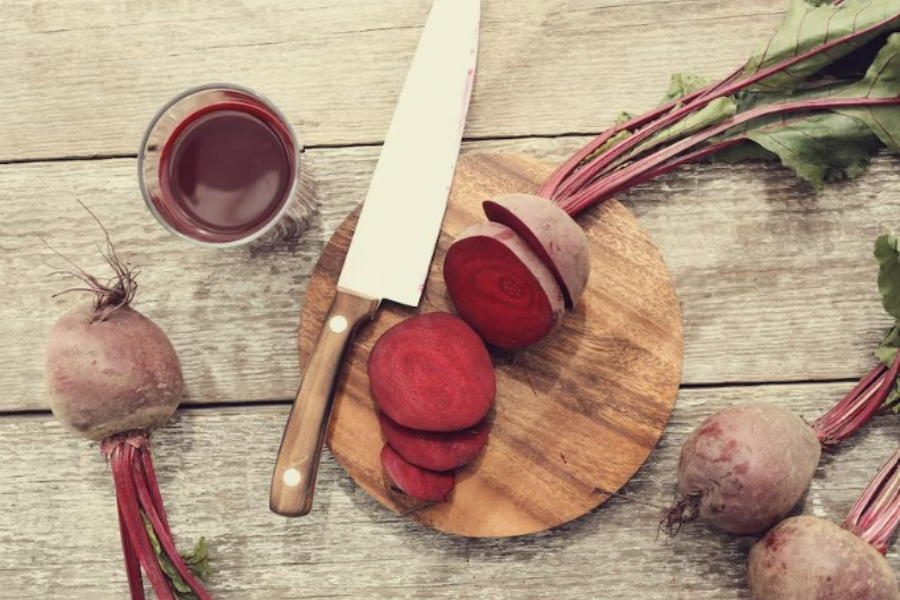
Beetroot has detoxifying properties and helps support your overall health during pregnancy / Image credit: Freepik
Yes, you can safely consume moderate amounts of beetroot during pregnancy. Beetroot offers detoxifying, blood-purifying, and revitalising properties, and is considered a healthy addition to your pregnancy diet.
You can consult your healthcare provider or nutritionist to determine the optimum amount of beetroot you can safely consume, depending on your health condition.
Nutritional Profile Of Beetroot
The US Department of Agriculture (USDA) claims in their study that a 100 gm serving of beetroot might offer you the following essential nutrients that could further help suffice your pregnancy needs.
| Nutrient | Recommended Dietary Allowance (RDA) | 100g Of Beetroot |
| Calcium | 100mg | 16mg |
| Folate | 600μg | 109μg |
| Magnesium | 350-360mg | 23mg |
| Iron | 27mg | 0.8mg |
| Potassium | 2900mg | 325mg |
| Dietary fibre | 28g | 2.8g |
10 Health Benefits Of Having Beetroot During Pregnancy
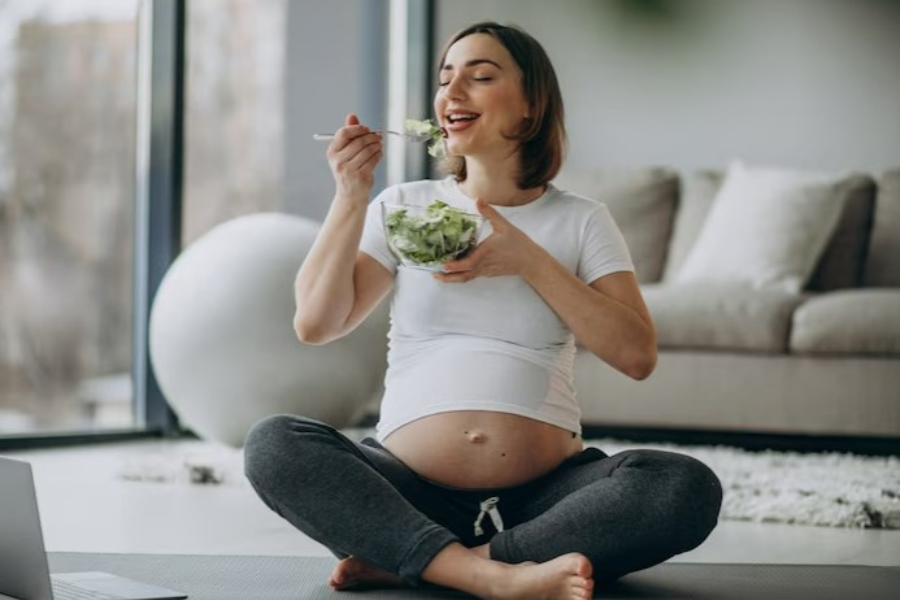
Beetroot enhances your digestive health and also reduces the risk of infections and diseases during pregnancy / Image credit: Freepik
Here’s how eating beetroot during pregnancy might aid in enhancing your prenatal health and the development of your baby.
- It reduces the risk of birth defects: Beetroot is among the few foods with the highest folic acid content. Including beetroot in your pregnancy diet might aid in the nervous system development of your baby and minimise the risk of birth defects, such as spina bifida.
- It boosts your immunity: Beetroot exhibits antioxidant properties that help boost your immune system. Hence, having beetroot during pregnancy can help ward off various infections and ailments.
- Prevents dental problems: Beets also have a good amount of silica content, which enables your body to utilise copper and magnesium. Along with it, beetroot also has calcium, which further helps prevent dental problems during pregnancy.
- It improves your metabolism: Beetroots have a high dietary fibre content that stimulates your gastrointestinal functions and boosts metabolism and offers relief from constipation.
- It eases joint pain and swelling: Beetroot contains betalain, which serves as a potent anti-inflammatory agent and helps ease swelling and pain in the joints during pregnancy.
- It purifies your blood: Beetroot has the capability to purify your blood and prevent the risk of diseases and infections in your baby. Also, consuming beetroot juice during pregnancy can help regulate your blood pressure and enhance stamina.
- It reduces the risk of pregnancy anaemia: Beetroot contains high levels of iron that boosts the haemoglobin count in your blood. Eating beetroot can thus reduce the risk of anaemia during pregnancy.
- It improves liver health: Beetroot contains a group of antioxidants called betacyanins and exhibits detoxifying properties that may help support your liver function during pregnancy.
- It supports fetal development: The folic acid content in beetroot helps in the optimal growth and development of the fetus.
- It improves your digestive health: The essential nutrients in beetroot help boost the production of good bacteria in your gut and reduce the risk of heartburn or flatulence during pregnancy.
Are There Side Effects Of Eating Beetroot During Pregnancy?
In some cases, your healthcare provider may impose a restriction on the excessive consumption of beetroot during pregnancy. This is because excess consumption of beetroot or its juice might affect your health in certain ways. We have discussed a few of the side effects here.
- Beetroot contains oxalate and high consumption of this compound may cause kidney stones.
- Beetroot also contains betaine, and if not eaten in moderation, it can cause nausea, vomiting, and other gastrointestinal issues during pregnancy.
- The presence of nitrates in beetroot may trigger fatigue.
- Excess consumption of beetroot can cause beeturia, a condition where your stool and urine turn red.
Like every other food, make sure to consume beetroot in moderation during pregancy. You can try several healthy recipes to add this superfood to your pregnancy diet.
3 Beetroot Recipes That You Can Try
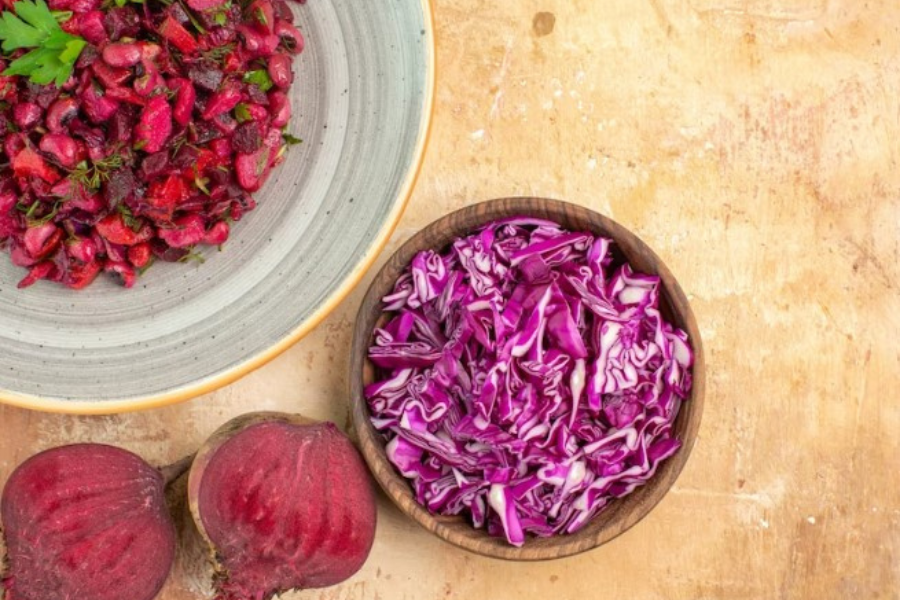
There are many simple beetroot recipes that you can add to your pregnancy diet / Image credit: Freepik
Pickled Beetroot
Pickled beetroots serve as the perfect snack, are a great addition to your salad, and also can be used as a side dish with sandwiches.
You will need:
- Around 6-7 small beetroots
- ¼ cup of white vinegar
- ½ cup of sugar
- ¼ teaspoon salt
- ½ teaspoon peppercorns
- 2 bay leaves
How to:
- Scrub the beetroots clean to remove any dirt.
- Place them in a saucepan and add water to boil.
- Cover the lid and let it simmer for about 45 minutes until the beets turn tender.
- Peel the beetroot skin and slice them thinly.
- Mix salt, sugar, vinegar, bay leaves, and peppercorns in a separate saucepan to make the vinaigrette.
- Pour the vinaigrette over the sliced beets and marinate for half an hour.
- Discard the bay leaves and store the pickled beets in an airtight container.
Easy Beetroot Salad
Beetroot salads are nutritious and for this recipe, you can even add the leaves of this veggie to boost its nutritional content. Beetroot leaves have a delicious taste and facilitate healthy growth in your baby.
You will need:
- 1-2 bunches of beetroot leaves
- 2 garlic closes
- 1 tablespoon of olive oil
- Black pepper powder
- ½ teaspoon of red pepper flakes
- 2 lemons
- Salt
How to:
- In boiling water, add salt and beetroot leaves and cook until tender.
- Drain the water and once cool, chop the leaves coarsely.
- In a skillet, heat oil and add pepper flakes and garlic. Cook for a minute and then add the greens.
- Top with salt and pepper.
Beetroot Tea
Beetroot tea is caffeine-free and you can easily make it at home with readily available ingredients.
You will need:
- 4 beets, finely shredded
- 1 quarter of water
- ½ cup of honey
- 4 sprigs mint
- 2 lemons, freshly squeezed
How to:
- Boil water and add lemon juice, beets, and honey.
- After turning off the heat, let the mixture steep for about 10-15 minutes.
- Strain and serve it with ice or mint.
Conclusion
Eating beetroot during pregnancy is considered highly beneficial as it lowers the risk of congenital anomalies in your baby, and enhances your immunity and digestive health. Plus, you can easily incorporate this super-healthy ingredient in several recipes and try the ones we discussed above.
However, make sure you have this vegetable in moderation, as excess consumption of beetroot may lead to vomiting, nausea, or even fatigue. So check with your doctor to know the right amount that is suitable for you.
Recommended Baby Care Products:
Also Read:
Ajwain during pregnancy: Learn all the benefits of having ajwain during pregnancy.
Eating fish during pregnancy: Can you eat all varieties of fish during pregnancy? Tap this post to know.
Eating kiwi during pregnancy: Here’s how kiwi benefits your overall health during pregnancy.
Cover Image Creedit: Freepik.com
A


Related Topics for you
Suggestions offered by doctors on BabyChakra are of advisory nature i.e., for educational and informational purposes only. Content posted on, created for, or compiled by BabyChakra is not intended or designed to replace your doctor's independent judgment about any symptom, condition, or the appropriateness or risks of a procedure or treatment for a given person.

